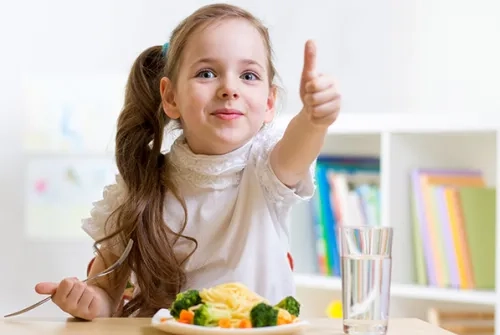Alo Yeditepe
Alo Yeditepe
Suggestions to Prevent Children from Gaining Weight While Still
The requirements of the period we are in have closely affected the health of children. Specialist Dietitian and Specialist Clinical Psychologist Merve Öz pointed out that many factors such as the limited time for children to go out, the inability to do any physical activity to throw their energy away, the increase in the duration of being dependent on the screen due to online lessons, of course, in addition to inactivity, increased amounts of food and the frequency of eating resulted in weight gain in some of the children. Stating that it is possible to prevent children from eating healthier and gaining weight with simple measures to be taken, Yeditepe University Hospitals Specialist Clinical Psychologist and Specialist Dietitian Merve Öz, listed the following suggestions…
Set Meals and Meal Hours and Stick to These Meals
Underlining that children should have 3 main meals; breakfast, lunch, and dinner, Specialist Dietitian and Specialist Clinical Psychologist Merve Öz said that there is a constant snacking situation in children when there is no snack, so taking the snack provides calorie control. She explained the following about snack planning: "Children should be planned in the form of at least 5 snacks; including a snack between breakfast and lunch, and a snack between lunch and dinner, and the time of these snacks should be determined. Depending on the child's needs, one more snack can be added after dinner and between lunch and dinner. However, it is very important to determine the main meal and snack times and to prevent children from eating outside these hours."
In children who develop continuous snacking behavior, in addition to main and snack meals until they adapt to the hours, foods with high water content such as cucumbers, lettuce, and carrots can be preferred between them, Specialist Dietitian Merve Öz gave healthy snack alternatives:
- 1 portion of fruit & 2 whole walnuts
- 1 glass of kefir or
- 1 slice of bread & 1 slice of feta cheese & plenty of greens
- 1 handful of chickpeas & 1 tablespoon of raisins
- 3 dried apricots + 6 almonds
- 1 cup yogurt & 3 tbsp. oatmeal
- 1 thin slice of homemade mother cake + 1 glass of milk
- 1 mother's cookie made at home + 1 glass of milk.
Do Not Eat During an Online Class or When Distracted
Specialist Dietitian Merve Öz pointed out that the behavior of eating while studying is learned by children and then this behavior continues, and when this behavior becomes a habit, it is not possible to study without eating at the table and weight control becomes difficult. However, indicating that eating makes it difficult to focus on the lesson and reduces working efficiency, Specialist Dietitian Merve Öz said: "In this case, children cannot focus on the lesson. When they concentrate on the lesson, they do not realize what they are eating. They notice that the fruit plate or the dried nut bowl is finished when they reach out to retrieve it again. It consumes the whole plate unconsciously, not because it is actually hungry, but because of the habit of the hand."
Get Your Child in the Habit of Drinking Water
"Water consumption is an extremely important habit in all age groups and for general health, it is absolutely necessary to consume sufficient amounts of water during the day," said Specialist Dietitian Merve Öz, and added "Children's drinking habits are very difficult. To do this, you must have a water bottle on your child's desk. Drinking water between classes should be ensured. In this way, it will be much easier to get rid of unnecessary eating habits."
Do Not Carry Food After Children
It is important that the place where you eat at home is fixed and that this place is a kitchen table or any table. Where you eat becomes a habit after a while. Underlining that there is a difference between the saturation of the food eaten while sitting, consciously walking around with the food eaten, or lying in front of the television, Specialist Dietitian Merve Öz continued as follows: "After activities that will get attention from eating such as watching television or playing computer games while eating, children get hungry more quickly. Instead, by chatting with the family, you get a better feeling of satiety after eating at the table."
Avoid Packaged Foods and Do Not Keep Them at Home
Reminding that packaged foods such as chocolate, biscuits, and chips attract more attention from children and prefer them primarily for eating, Specialist Dietitian Merve Öz said, "For this reason, it is the healthiest not to take packaged products home. Instead, it should be given home-made products provided that the amount is controlled."
Make Sure Your Children Taste the Flavors of Fruits and Vegetables
Saying that it is very important for children to consume fruits and vegetables and to develop resistance to diseases, Yeditepe University Hospital Specialist Dietitian and Specialist Clinical Psychologist Merve Öz added: "Vegetables and fruits, which are rich in minerals and vitamins, also help the intestines work regularly. In addition, there will be less space for calorie foods as they will fill up a part of the stomach volume and create a feeling of fullness. Introducing children to vegetables and fruits at an early age will also be useful in preventing the habit of choosing food. They will choose less food. Children, who are biased towards new tastes as they grow older, continue their lives without looking at the tastes of some vegetables and never consuming those vegetables again. Therefore, children should be introduced to all vegetables and fruits at an early age."
Press Coverage: milliyet.com | haberturk.com | gazetevatan.com | aksam.com | hurriyet.com | cnnturk.com | haberler.com
About
Faculty and Year of Graduation:
Yeditepe University Faculty of Arts and Sciences, Department of Psychology and Faculty of Health Sciences, Department of Nutrition and Dietetics, 2016
”
See Also
- What is Vitamin A? What are the benefits of Vitamin A?
- What is Selenium? What Does It Do? What are the Benefits?
- Does the Sweltering Heat Affect Our Mental Health?
- What is Vitamin E?
- What is Coenzyme Q₁₀? What are the Benefits of Coenzyme Q₁₀?
- What is Vitamin B12? What are the Symptoms of B12 Deficiency?
- What is Mythomania (Pathological Lying Disorder)? What Causes Mythomania?
- What is Emotional Hunger? How Does It Arise?
- Benefits of Spices
- What Does Narcissist Mean? Narcissistic Personality Disorder
- At What Age Should Children Start Using Social Media?
- What is the Ideal Age for Marriage?
- Special Nutrition Recommendations for the Eid
- The True Face of the Protein Myth
- What Are the Benefits of Beets?
- Suggestions to Get Rid of the Menopause Belly
- "Is the Watermelon Diet Healthy?
- Ways to Boost Mental Resilience
- Frequently Asked Questions about Detox
- Boost Your Immunity Naturally
- Which Foods Should be Consumed Together?
- How Do You Approach a Child Who Is Reluctant to Go to School?
- Stop Blaming Yourself
- The Concern of Being a ‘’Good Mother’’ in Pregnancy
- It is Possible to Lose Weight by Dominating Your Brain
- Mom, Can I Sleep With You?
- 9 Points to Be Considered for a Healthy Ramadan Month!
- Emotional Eating May Be the Cause of Your Weight Gain
- The Healthiest Summer Fruits
- Shining Star of the Tables: Probiotics
- The Problem may be the Lack of Self-Confidence!
- Ways to Deal with Quarantine Weight
- Burnout Syndrome at Work Gains Weight
- Children Should Be Away From Fast Food Toy
- Children's Eating While Studying Prepares the Ground for Obesity
- Permeable Bowel Syndrome Can Prepare the Ground for Diseases
- 8 Suggestions to Keep the Immune System Strong in Ramadan
- 8 Suggestions for Kids with Focus Problems
- It is also Possible to Lose Weight During the Holidays!
- Immune Enhancing Nutrients
- Is Co-Sleeping With the Child Right?
- Healthy New Year's Eve Table Suggestions
- Do not take unneeded calories to your body
- Suggestions to Increase Metabolic Rate…
- Nutrition Recommendations Before the Exam
- How to Feed Children in Summer?
- Is There a Nutritional Difference Between Sports to Increase BMI and Sports to Lose Weight?
- What Should You Do to Avoid Gaining Weight for the Holidays? Do Not Be a Victim of the Buffet
- Cancer and Nutrition
- Nutrition and Diet
- Healthy Diet
- Elderly Care
- Alkaline Nutrition
- 9 Tips to Prevent You from Gaining Weight While at Home
- 9 Suggestions to Fix Childrens Deteriorated Eating Habits
- Fibromyalgia May Be the Cause of Persistent Pain
- What to do from Iftar to Sahur for a Healthy Ramadan
Alo Yeditepe




